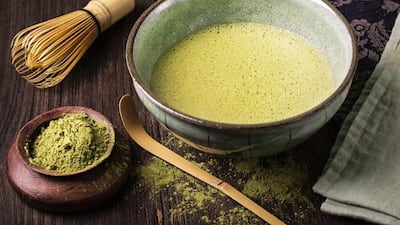It boasts five times more antioxidants than any other tea, fortifies the immune system and is believed to lower cholesterol levels, boost energy and burn calories.
This is matcha, a variety of green tea most commonly used in Japanese tea ceremonies and now a rising superfood trend in the UAE with a dozen cafes and stores already serving it, in addition to leading supermarkets stocking it on their shelves.
Matcha is a powdered tea that completely dissolves in water. Top-grade brands are a vibrant lime-green shade. The lighter-green varieties are sweeter, with the darker ones more astringent.
Unlike other green teas, the leaves (called tencha) are steamed then dried, not rolled. The leaf veins and fine stems are removed before the leaves are ground into a fine powder.
A steady increase in demand for matcha tea, both as a drink and food item, has been reported by the newly opened Mikado Café in Khalidiya, Abu Dhabi; Argo Tea, which has locations across the country; and Comptoir 102 Café in Dubai.
“Matcha is second to sencha in terms of sales, with customers preferring it over hojicha, kukicha and bancha teas,” says Soham Changrani, restaurant manager of Mikado Café. “They tend to choose iced matcha rather than the traditional hot matcha tea as it has a milder flavour. Our matcha roll cake is also a best-seller.”
Comptoir 102 Café already has several customers who are tremendously loyal to matcha.
“Not only are they aware of matcha’s health benefits but they enjoy the delicate taste,” says the co-owner Emma Sawko. “We are trying to educate new customers by explaining why matcha is so good, and by also developing new recipes.”
Matcha does contain caffeine, an amount similar to that found in about half a cup of brewed coffee. So how does this correlate with the health benefits?
“Matcha is rich in L-theanine, a rare amino acid that actually promotes a state of relaxation and well-being by acting upon the brain’s functioning,” says Hussam El Batta, senior brand manager for Argo Tea.
“While stress can induce beta waves resulting in an excited, more agitated state, L-theanine creates alpha waves, which lead to a state of relaxed alertness.
“And while L-theanine is common in all tea, matcha may contain up to five times more of this amino acid than common black and green teas. As an additional benefit, L-theanine can help promote concentration without any of the nervous energy found in coffee.”
Brew a cuppa
• Warm a drinking bowl and a whisk with hot water, then tip the water away.
• Measure two-thirds of a teaspoon of matcha into the bowl and gently pour in 60ml water heated to 80°C.
• Whisk briskly to make a foamy liquid.
• Samantha Wood is the founder of the impartial restaurant-review website www.foodiva.net
artslife@thenational.ae

